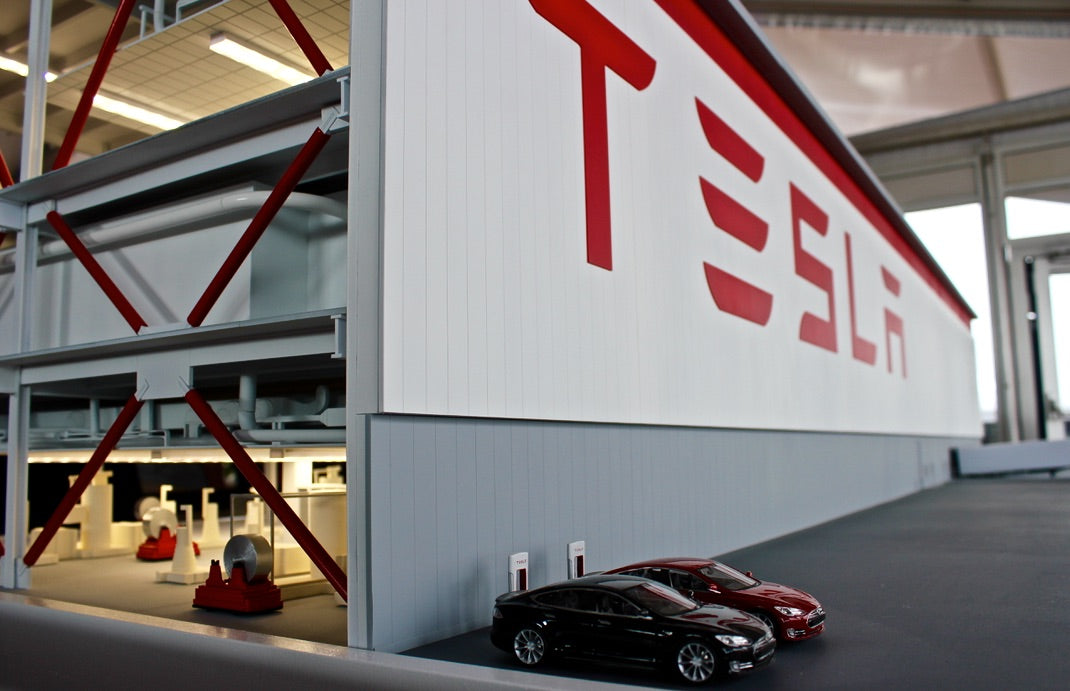
Tesla: Leading the Charge in Electric Vehicle Innovation
Share
Tesla, founded in 2003, has redefined the automotive and energy sectors with its revolutionary electric vehicles (EVs) and sustainable energy solutions. Under the leadership of CEO Elon Musk, Tesla's innovations have driven the global transition towards clean energy and autonomous driving technologies, positioning it as a leader in both industries.
Founding and Early Challenges
Tesla was established by Martin Eberhard and Marc Tarpenning, with Elon Musk joining shortly after as chairman of the board. The company’s mission was to accelerate the world’s transition to sustainable energy. Tesla’s early years were marked by significant challenges, including skepticism about the viability of electric cars and financial constraints. Despite these obstacles, Tesla persevered and unveiled its first car, the Roadster, in 2008. The Roadster demonstrated Tesla’s ability to produce high-performance electric vehicles, achieving unprecedented ranges of over 200 miles on a single charge.
Key Innovations: EVs and Energy Solutions
Tesla’s core offerings include its electric vehicles and energy products:
Electric Vehicles (EVs): Tesla's lineup of EVs, including the Model S, Model 3, Model X, and Model Y, has set new standards for performance, safety, and range. The introduction of the Tesla Gigafactories has enabled large-scale production, driving down costs and making EVs more accessible. Tesla's vehicles are renowned for their advanced features, such as Autopilot, a semi-autonomous driving system that leverages AI and machine learning to enhance safety and convenience. The Model S Plaid, for instance, boasts a 0-60 mph acceleration time of under 2 seconds, making it the fastest production car in the world.
Energy Solutions: Tesla’s energy products, including the Powerwall, Powerpack, and Solar Roof, aim to create a sustainable energy ecosystem. The Powerwall is a home battery system that stores solar energy for use during power outages or peak demand. The Solar Roof integrates seamlessly with existing structures, providing renewable energy while maintaining aesthetic appeal. Tesla’s energy solutions contribute to reducing reliance on fossil fuels and promoting clean energy adoption. The company’s energy division has expanded to include utility-scale projects, such as the Hornsdale Power Reserve in South Australia, which is the world’s largest lithium-ion battery installation.
Impact Across Industries
Automotive: Tesla’s impact on the automotive industry is profound, pushing traditional manufacturers to innovate and invest in electric mobility. The company’s focus on over-the-air software updates, advanced driver-assistance systems, and continuous improvements in battery technology has set a new benchmark for the industry. Tesla’s Gigafactories, located in the United States, China, and Germany, are critical to scaling production and meeting global demand.
Energy: Tesla’s energy products are transforming how households and businesses consume and store energy. The integration of solar power and energy storage solutions offers a sustainable alternative to traditional energy sources, reducing carbon footprints and promoting energy independence. Tesla’s solar and energy storage solutions have been deployed in diverse applications, from residential rooftops to large-scale commercial installations.
Autonomous Driving: Tesla’s Autopilot and Full Self-Driving (FSD) technologies represent significant advancements in autonomous driving. By leveraging AI and vast amounts of data from its fleet, Tesla aims to achieve full autonomy, enhancing safety and efficiency on the roads. Tesla’s self-driving technology has the potential to revolutionize transportation, reducing traffic accidents and enabling new business models, such as robotaxis. The company has already initiated limited rollouts of its FSD Beta to select customers, showcasing its progress in developing fully autonomous vehicles.
Artificial Intelligence and Future Directions
Under Elon Musk’s leadership, Tesla is at the forefront of AI integration in the automotive industry. The company’s AI initiatives include the development of custom AI chips, such as the Full Self-Driving Computer, and the Dojo supercomputer for training neural networks. These AI advancements enable Tesla to process vast amounts of data more efficiently, improving the capabilities of its autonomous driving systems. Tesla’s vision extends beyond cars to include the creation of a sustainable energy ecosystem, encompassing energy generation, storage, and consumption.
Ethical Considerations and Privacy
Tesla’s advancements in autonomous driving and data collection have sparked ethical and privacy debates. The company collects vast amounts of data to improve its AI systems, raising concerns about data privacy and security. Tesla is committed to addressing these challenges by implementing robust data protection measures and advocating for responsible AI development. The company also emphasizes transparency with its customers regarding data usage and privacy practices.
Conclusion
Tesla has revolutionized the automotive and energy sectors with its cutting-edge electric vehicles and sustainable energy solutions. From advancing autonomous driving technology to promoting clean energy adoption, Tesla’s impact is significant and far-reaching. As the company continues to innovate and expand its influence, Tesla’s commitment to sustainability and technological advancement positions it as a key player in shaping the future of transportation and energy.
Founding and Early Challenges
Tesla was established by Martin Eberhard and Marc Tarpenning, with Elon Musk joining shortly after as chairman of the board. The company’s mission was to accelerate the world’s transition to sustainable energy. Tesla’s early years were marked by significant challenges, including skepticism about the viability of electric cars and financial constraints. Despite these obstacles, Tesla persevered and unveiled its first car, the Roadster, in 2008. The Roadster demonstrated Tesla’s ability to produce high-performance electric vehicles, achieving unprecedented ranges of over 200 miles on a single charge.
Key Innovations: EVs and Energy Solutions
Tesla’s core offerings include its electric vehicles and energy products:
Electric Vehicles (EVs): Tesla's lineup of EVs, including the Model S, Model 3, Model X, and Model Y, has set new standards for performance, safety, and range. The introduction of the Tesla Gigafactories has enabled large-scale production, driving down costs and making EVs more accessible. Tesla's vehicles are renowned for their advanced features, such as Autopilot, a semi-autonomous driving system that leverages AI and machine learning to enhance safety and convenience. The Model S Plaid, for instance, boasts a 0-60 mph acceleration time of under 2 seconds, making it the fastest production car in the world.
Energy Solutions: Tesla’s energy products, including the Powerwall, Powerpack, and Solar Roof, aim to create a sustainable energy ecosystem. The Powerwall is a home battery system that stores solar energy for use during power outages or peak demand. The Solar Roof integrates seamlessly with existing structures, providing renewable energy while maintaining aesthetic appeal. Tesla’s energy solutions contribute to reducing reliance on fossil fuels and promoting clean energy adoption. The company’s energy division has expanded to include utility-scale projects, such as the Hornsdale Power Reserve in South Australia, which is the world’s largest lithium-ion battery installation.
Impact Across Industries
Automotive: Tesla’s impact on the automotive industry is profound, pushing traditional manufacturers to innovate and invest in electric mobility. The company’s focus on over-the-air software updates, advanced driver-assistance systems, and continuous improvements in battery technology has set a new benchmark for the industry. Tesla’s Gigafactories, located in the United States, China, and Germany, are critical to scaling production and meeting global demand.
Energy: Tesla’s energy products are transforming how households and businesses consume and store energy. The integration of solar power and energy storage solutions offers a sustainable alternative to traditional energy sources, reducing carbon footprints and promoting energy independence. Tesla’s solar and energy storage solutions have been deployed in diverse applications, from residential rooftops to large-scale commercial installations.
Autonomous Driving: Tesla’s Autopilot and Full Self-Driving (FSD) technologies represent significant advancements in autonomous driving. By leveraging AI and vast amounts of data from its fleet, Tesla aims to achieve full autonomy, enhancing safety and efficiency on the roads. Tesla’s self-driving technology has the potential to revolutionize transportation, reducing traffic accidents and enabling new business models, such as robotaxis. The company has already initiated limited rollouts of its FSD Beta to select customers, showcasing its progress in developing fully autonomous vehicles.
Artificial Intelligence and Future Directions
Under Elon Musk’s leadership, Tesla is at the forefront of AI integration in the automotive industry. The company’s AI initiatives include the development of custom AI chips, such as the Full Self-Driving Computer, and the Dojo supercomputer for training neural networks. These AI advancements enable Tesla to process vast amounts of data more efficiently, improving the capabilities of its autonomous driving systems. Tesla’s vision extends beyond cars to include the creation of a sustainable energy ecosystem, encompassing energy generation, storage, and consumption.
Ethical Considerations and Privacy
Tesla’s advancements in autonomous driving and data collection have sparked ethical and privacy debates. The company collects vast amounts of data to improve its AI systems, raising concerns about data privacy and security. Tesla is committed to addressing these challenges by implementing robust data protection measures and advocating for responsible AI development. The company also emphasizes transparency with its customers regarding data usage and privacy practices.
Conclusion
Tesla has revolutionized the automotive and energy sectors with its cutting-edge electric vehicles and sustainable energy solutions. From advancing autonomous driving technology to promoting clean energy adoption, Tesla’s impact is significant and far-reaching. As the company continues to innovate and expand its influence, Tesla’s commitment to sustainability and technological advancement positions it as a key player in shaping the future of transportation and energy.
